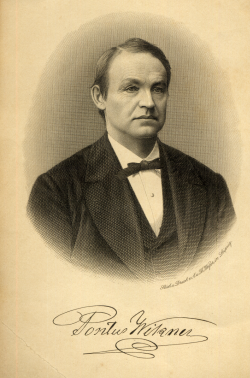

Queer Places:
Uppsala old cemetery, Villavägen 1B, 751 08 Uppsala, Sweden
 Carl Pontus Wikner (1837-1888) was a Swedish philosopher, associate professor of theoretical philosophy at Uppsala University and professor of philosophy in Oslo (then Kristiania).
Wikner left his diaries to the Uppsala medical faculty, along with his
‘Psychological Confessions’ (1879), in which he defended the right of
homosexuals to marry. The confessions were not to be published until after the
death of his children. When he launched this message in a bottle, he could
hardly have known how many other bottles would wash up on the distant shore:
You, man, who read these lines, they are written to you by a brother who has
suffered much. My thoughts are wrung from the deepest distress, yet still they
try to find expression. O, that you could and would understand me! Some people
are capable of deep, heartfelt, self-sacrificing love, yet the only possible
object of their love is a person of their own sex. There are said to be such
women, and I know that such men exist. I myself am such a man. These
confessions contain a life of anguish.
Carl Pontus Wikner (1837-1888) was a Swedish philosopher, associate professor of theoretical philosophy at Uppsala University and professor of philosophy in Oslo (then Kristiania).
Wikner left his diaries to the Uppsala medical faculty, along with his
‘Psychological Confessions’ (1879), in which he defended the right of
homosexuals to marry. The confessions were not to be published until after the
death of his children. When he launched this message in a bottle, he could
hardly have known how many other bottles would wash up on the distant shore:
You, man, who read these lines, they are written to you by a brother who has
suffered much. My thoughts are wrung from the deepest distress, yet still they
try to find expression. O, that you could and would understand me! Some people
are capable of deep, heartfelt, self-sacrificing love, yet the only possible
object of their love is a person of their own sex. There are said to be such
women, and I know that such men exist. I myself am such a man. These
confessions contain a life of anguish.
Wikner was a poor and talented child from the Schartauan border regions between Dalsland and Bohuslän (in the present Munkedal municipality). Three and a half years old he learned to read. As a seven-year-old he threw himself into biblical history in German. And within a few more years, he saw him sit deeper in English and Latin grammar - all of his interest and largely on his own. In the summer of 1871 he married the childhood friend Ida Weinberg (1837-1910). They got two sons, Ernst and Hugo.
Wikner grew up in a dwelling at the Barracks in Foss's parish. There, the local community association has restored Pontus Wiknergården and uses it as a home town yard.
Towards the end of his life, Wikner wrote that he suffered from four chronic disorders. One of them - a heart too big - he mention with a certain pride. He died in 1888, just before he was about to reach fifty.
Pontus Wikner is buried at Uppsala's old cemetery (Villavägen 1B, 751 08 Uppsala). In 1902, a monument was unveiled to his honor. A speech was held by JA Eklund , later bishop in Karlstad's diocese.
Wikner was, as a philosopher, influenced by Christopher Jacob Boström, but made his own independent view, both in scholarly writings and partly in more popular, rare well-written works. Among these, a series of philosophical and religious lectures, such as the Cultural Sacrifice, the Narcissus Story, and some historical novels influenced by Rydberg's style art, distinguished by the philosophy of thought, form beauty and a warm religious spirit.
Wikner was one of the members of the so-called Unnamed Society.
In Pontus Wikner, Swedish gay movement has seen an early role model. His private notes and diaries were compiled into the work “Psykologiska självbekännelser” (Psychological Self-Confessions) which came out posthumously in 1971, after his closest relatives (wife and sons) had died. In these diaries, he writes frankly about his homosexuality and presents thoughts about gay marriage.
My published books: